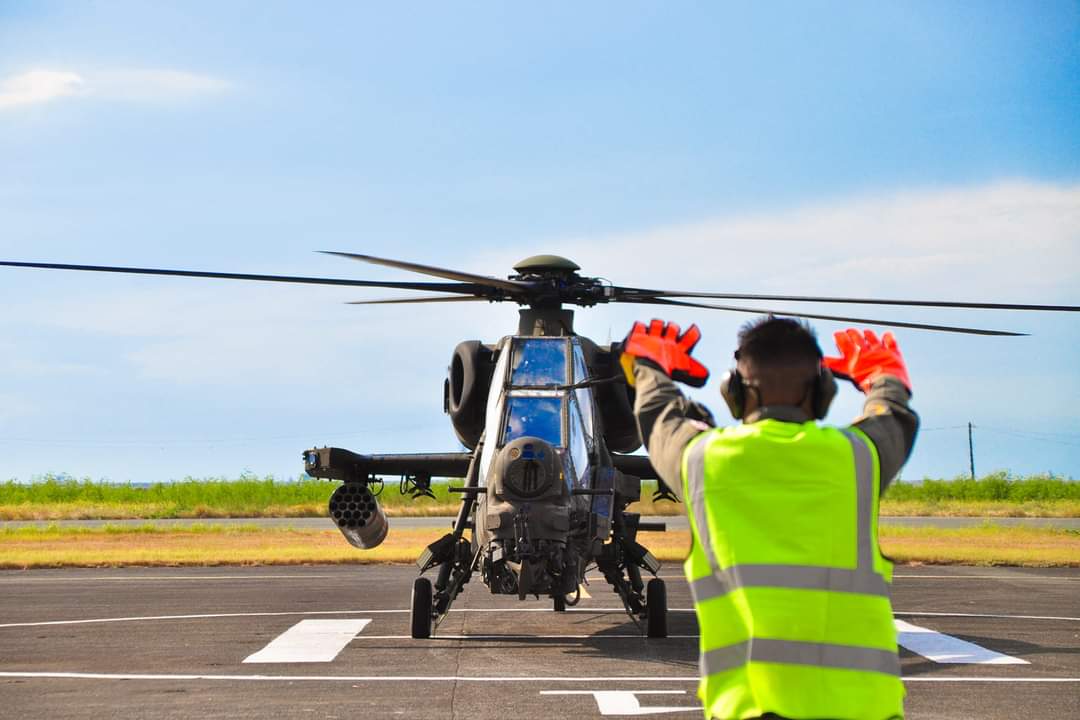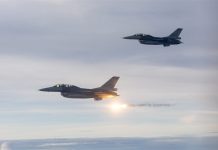The Philippine Air Force (PAF) has officially taken delivery of the final two T-129 ATAK helicopters from Turkey, marking the successful completion of a key procurement program.
The formal acceptance ceremony took place on May 17 at Major Danilo Atienza Air Base in Cavite, where the new aircraft, bearing tail numbers 1505 and 1506, were greeted with a traditional water cannon salute.
In a statement, the PAF detailed the helicopters’ ceremonial arrival, highlighting their low pass before landing and the traditional water cannon salute they received.
“These helicopters, known for their high performance in hot, high, and maritime conditions, are expected to significantly enhance the air force’s combat capabilities, particularly in urban warfare scenarios,” the PAF said.
Two new T-129 ATAK helicopters were formally accepted at the PAF Air Base in Cavite on May 17, 2024. The helicopters performed a low pass before landing, receiving a traditional water cannon salute. A blessing ceremony marked the official entry of the T-129s into the PAF fleet. pic.twitter.com/EME26GYKYK
— Philippine Air Force (@PhilAirForce) May 22, 2024
The final pair of helicopters arrived in the Philippines on November 29, 2023, and underwent a thorough technical inspection before being formally inducted into the PAF fleet.
The delivery follows the previous batches received in 2022, with the first two units arriving on March 9, 2022, and the second batch on November 24, 2022. With the latest addition, the total number of T-129 ATAK helicopters in the PAF inventory now stands at six.

The procurement of these helicopters began in the aftermath of the Battle of Marawi in 2017 (a five-month-long armed conflict in Marawi, Philippines, that started on May 23, 2017, between Philippine government security forces against militants affiliated with the Islamic State).
An evaluation by the PAF revealed that the helicopters in use at that time, the MD-520 MG-20 Defender and the AW-109E, lacked sufficient firepower for their missions.
This led to the initiation of the Attack Helicopter Acquisition Project (AHAP) under the Horizon 2 phase of the Revised AFP Modernization Program.
The evaluation process shortlisted three candidates: the T129 from Turkish Aerospace Industries (TAI), the US Bell AH-1Z Viper, and the US Boeing AH-64E Apache Guardian.
Despite the Apache being regarded as the best attack helicopter available, its high cost led the PAF Technical Working Group to choose the T129.
In 2021, the Department of National Defense signed a contract for six T-129Bs through a government-to-government deal with the Turkish Ministry of Defense. TAI’s ability to meet the approved budget with six units solidified the decision.
These newly acquired T-129 ATAK helicopters are anticipated to significantly bolster the PAF’s operational capabilities, particularly in urban combat scenarios, thereby enhancing national defense and security.
Denied To Pakistan
The twin-engine, lightweight T129 was collaboratively designed and produced by Turkish Aerospace Industries (TAI) and Italy’s AgustaWestland.
With its state-of-the-art observation and targeting systems, coupled with precision weaponry, the T129 offers formidable fire support capabilities. The focus is on minimizing collateral damage.
This blend of advanced technology and strategic utility of the Turkish helicopters has garnered international interest and procurement deals. In addition to the Philippines, Nigeria has also procured this attack helicopter.
In July 2022, Nigerian officials signed an agreement with Turkey for six T129 helicopters, each valued at approximately US$45 million. The delivery of the first two units was completed in November 2023.
Pakistan, too, wanted to enhance its fleet with the T129. In 2017, Pakistan signaled its intention to replace its aging Bell AH-1F Cobra gunships with the T129.

A promising deal was announced in 2018, with Pakistan agreeing to purchase 30 helicopters for a significant sum of $1.5 billion. This deal was poised to strengthen the ties between Turkey and Pakistan while bolstering Pakistan’s military capabilities.
However, the path to fulfilling this agreement was fraught with challenges. Political tensions between the United States and Turkey cast a shadow over the deal.
The United States Department of Defense (DoD) refused to issue export licenses for the crucial LHTEC T800-4A engines, citing diplomatic tensions between the US and Turkey.
Despite TAI’s efforts to navigate the diplomatic quagmire, including seeking indigenous engine alternatives and enlisting the support of US lobbying firms, the deal remained in limbo.
In 2021, Turkey’s then-presidential spokesman, Ibrahim Kalin, suggested that the obstruction could prompt Islamabad to consider procuring helicopters from China instead.
Pakistan extended multiple deadlines in the hope of resolving the issue, but by 2022, reports surfaced suggesting the deal had been canceled. Pakistan’s Inter-Services Public Relations (ISPR) denied the reports, but uncertainty shrouded the future of the agreement.
The status of the Pakistan-T129 deal remains elusive. Reports suggest Pakistan is inclining toward acquiring Z-10ME helicopters from China.
- Contact the author at ashishmichel(at)gmail.com
- Follow EurAsian Times on Google News




